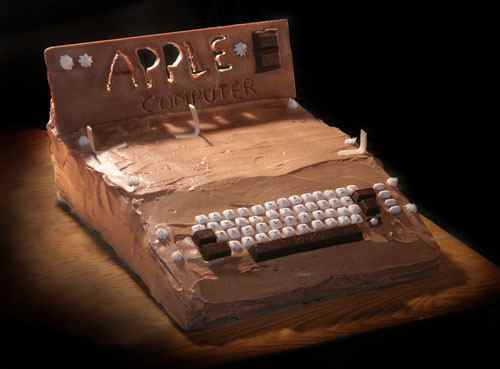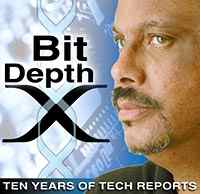BitDepth 519 - April 11
07/01/09 19:30 Filed in: BitDepth - April 2006
Apple turns 30. Time to reflect on the company that's been written off more times than a politician's debts...
Apple turns 30

The original Apple computer...kind of. Nitrozac and Snaggy at the Joy of Tech cartoon website decided to honour Apple's birthday with a cake made just like the original Apple designed by Steve Wozniak. Instructions are here.
Photo courtesy of Snaggy at JoT.
On April 1st, 2006, Apple Computer officially entered maturity by any measure, clocking 30 years as a manufacturer of computers. Now some might argue that Apple really sells style, packaging their easy to use software in premium grade hardware, while others might opine that the company's selling their own mythology, the tale of the underdog that made good. Maybe even better than good.
From the pre-Apple days when the Steves, Jobs and Wozniak, couldn't catch a break from Atari and HP, the companies they brought their clunky prototype of a kit (assembly required) personal computer to today, with the company drawing close to its second stock split in less than eighteen months, Apple has always managed to look like the diva at the dance who isn't sure she has a ride home.
Mr Jobs declined to have any festivities to mark the 30th anniversary of the company he returned to helm in triumph, but that's probably because he's busy gearing up for his new role on Disney's board and plotting the future of Apple.
This year marks some other notable anniversaries in the company's history as well. It's been 22 years since Apple abandoned the computers it gained its early fame with to transition to the Macintosh, which introduced pointing and clicking to mass audiences for the first time.
It's also been five years since the company transitioned (there's that word again) from the legacy operating system it honed and tweaked and finally nursed from the earliest Macs to the gumdrop iMacs to a robust Unix based kernel it dubbed MacOS X.
Looking back, the only consistent thing about Apple's offerings has been the astonishing number of changes they have been through, a process of evolution that has cost the company marketshare and a place in the business sector, which tends to like its computing changes measured and well paced.
Last week, Apple delivered one more change. To match its switch to processors from Intel and new motherboard designs that have more in common with standard Wintel PCs than ever before, it introduced Boot Camp, a "public beta" of software scheduled for release in the next version of the Mac operating system which allows the Mac faithful to run Windows XP natively on their new computers with Intel inside.
It's been possible to run Microsoft's Windows on a Macintosh for some time using emulators like Virtual PC and Bochs, which translate the incompatible PC code for the Mac's Power PC processors. But that process was slow and unsatisfactory for anything but the most basic use.
Ever since the new Macs with Intel Dual Core chips at their heart were introduced, the race has been on to see who would be able to hack Windows to work on the new boxes.
That competition was won by mid-March and the result posted here, supported by close to US$14,000 worth of donations from visitors. But a hack is a hack and the Bootloader solution was creaky, with missing drivers for the video on the new Macs.
Apple's solution opens a new door in the evolution of the Macintosh, allowing users with only a moderate understanding of computer systems to create a CD with the missing drivers the Windows installation will need to run the new Macs and install Windows XP on a software generated partition on the drive.
It's a pleasant surprise to note that you don't have to reformat or reinstall anything on the Mac side of things, you just need enough disk space for your XP install.
Bootloader may have won the race, but Boot Camp takes the trophy. Apple's instructions for the software tread a fine line between trumpeting just how easy Boot Camp is to use and warning that Mac users running Windows are on their own.
Apple couldn't have announced this on its 30th birthday, it would have taken days for people to realise that it wasn't just a joke and the new software, particularly this new software, is serious business.
When the Intel-based Macs were announced, Apple noted that legacy software from the pre-OS X days wouldn't run on it, shutting out thousands of applications that didn't make the jump to the new operating system.
But now Apple also giveth, opening the door to hundreds of thousands of software titles that previously couldn't run on a standard Macintosh.
For the many newcomers to the Macintosh, it's the best of both worlds but for the hardcore Mac faithful, Windows booting on their beloved computer is just another reminder that you can't trust anyone over 30.

The original Apple computer...kind of. Nitrozac and Snaggy at the Joy of Tech cartoon website decided to honour Apple's birthday with a cake made just like the original Apple designed by Steve Wozniak. Instructions are here.
Photo courtesy of Snaggy at JoT.
On April 1st, 2006, Apple Computer officially entered maturity by any measure, clocking 30 years as a manufacturer of computers. Now some might argue that Apple really sells style, packaging their easy to use software in premium grade hardware, while others might opine that the company's selling their own mythology, the tale of the underdog that made good. Maybe even better than good.
From the pre-Apple days when the Steves, Jobs and Wozniak, couldn't catch a break from Atari and HP, the companies they brought their clunky prototype of a kit (assembly required) personal computer to today, with the company drawing close to its second stock split in less than eighteen months, Apple has always managed to look like the diva at the dance who isn't sure she has a ride home.
Mr Jobs declined to have any festivities to mark the 30th anniversary of the company he returned to helm in triumph, but that's probably because he's busy gearing up for his new role on Disney's board and plotting the future of Apple.
This year marks some other notable anniversaries in the company's history as well. It's been 22 years since Apple abandoned the computers it gained its early fame with to transition to the Macintosh, which introduced pointing and clicking to mass audiences for the first time.
It's also been five years since the company transitioned (there's that word again) from the legacy operating system it honed and tweaked and finally nursed from the earliest Macs to the gumdrop iMacs to a robust Unix based kernel it dubbed MacOS X.
Looking back, the only consistent thing about Apple's offerings has been the astonishing number of changes they have been through, a process of evolution that has cost the company marketshare and a place in the business sector, which tends to like its computing changes measured and well paced.
Last week, Apple delivered one more change. To match its switch to processors from Intel and new motherboard designs that have more in common with standard Wintel PCs than ever before, it introduced Boot Camp, a "public beta" of software scheduled for release in the next version of the Mac operating system which allows the Mac faithful to run Windows XP natively on their new computers with Intel inside.
It's been possible to run Microsoft's Windows on a Macintosh for some time using emulators like Virtual PC and Bochs, which translate the incompatible PC code for the Mac's Power PC processors. But that process was slow and unsatisfactory for anything but the most basic use.
Ever since the new Macs with Intel Dual Core chips at their heart were introduced, the race has been on to see who would be able to hack Windows to work on the new boxes.
That competition was won by mid-March and the result posted here, supported by close to US$14,000 worth of donations from visitors. But a hack is a hack and the Bootloader solution was creaky, with missing drivers for the video on the new Macs.
Apple's solution opens a new door in the evolution of the Macintosh, allowing users with only a moderate understanding of computer systems to create a CD with the missing drivers the Windows installation will need to run the new Macs and install Windows XP on a software generated partition on the drive.
It's a pleasant surprise to note that you don't have to reformat or reinstall anything on the Mac side of things, you just need enough disk space for your XP install.
Bootloader may have won the race, but Boot Camp takes the trophy. Apple's instructions for the software tread a fine line between trumpeting just how easy Boot Camp is to use and warning that Mac users running Windows are on their own.
Apple couldn't have announced this on its 30th birthday, it would have taken days for people to realise that it wasn't just a joke and the new software, particularly this new software, is serious business.
When the Intel-based Macs were announced, Apple noted that legacy software from the pre-OS X days wouldn't run on it, shutting out thousands of applications that didn't make the jump to the new operating system.
But now Apple also giveth, opening the door to hundreds of thousands of software titles that previously couldn't run on a standard Macintosh.
For the many newcomers to the Macintosh, it's the best of both worlds but for the hardcore Mac faithful, Windows booting on their beloved computer is just another reminder that you can't trust anyone over 30.
blog comments powered by Disqus

